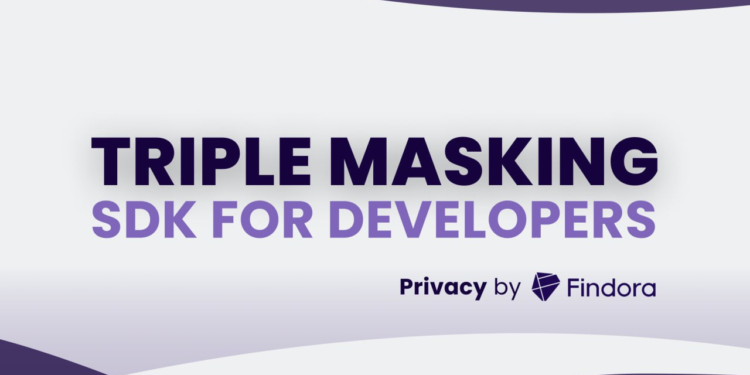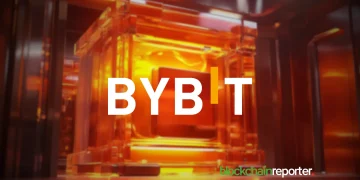Findora has launched the Findora Triple Masking SDK, which is a set of privacy-preserving solutions for Web3. This Layer-1 blockchain is known for its innovation in combining privacy with auditability to support regulatory compliance. The Findora Triple Masking SDK provides developers with a straightforward method for integrating zero-knowledge proofs into their decentralized applications (dApps).
Users will have the ability to perform private transactions that can still be audited, and they will have a variety of choices regarding the information that is concealed or that continues to be transparent. The Findora Triple Masking SDK makes implementing privacy protection in every Web3 dApp as easy as plugging and playing a device.
Simplifying the Developer Experience of Implementing ZK-proofs
The issue of ownership for digital assets, specifically how to prevent exact replication and the “double-spend” problem, was solved by blockchain technology. This was made possible through a decentralized accounting system that allowed for transparency in tracking the movement of each digital asset. The transfer of these assets was required to be viewable by the general public, despite the fact that this technology did away with the requirement that a reliable third party serve as the record-keeper.
As a direct consequence of this, businesses and organizations that were mandated by law to keep specific types of personally identifying information confidential (like medical records, for example) were unable to make use of this new technological development. Regulations have mandated financial institutions to safeguard privacy for half a century. Customers possess the right to maintain the confidentiality of their personal financial information from the public at large.
The regulations governing these institutions emphasize the importance of obtaining the consent of bank customers before sharing their personal identification details such as account balances, product purchases, and other similar information. Privacy has been rightfully acknowledged as a user’s sole authority to control and permit access to their data. The cryptographic approach of Zero-Knowledge proofs permits blockchains to maintain transaction data confidentiality while simultaneously enabling data validation.
Despite the computational complexity, this technique enables blockchain to authenticate the movement of a specific digital asset without revealing any details about the sender, receiver, or the asset itself. In essence, Zero-Knowledge proofs serve as a crucial element that facilitates private transactions of digital assets while ensuring that they are spent only once.
Sam Harrison, CEO of Discreet Labs, said: “Triple Masking fulfills a promise that blockchain technology made years ago: your financial status, your financial future, is no longer in the hands of some unknown, so-called “trusted” third party. It’s in your hands. This SDK simplifies the developer experience of implementing complicated ZK-proofs, which in turn enables more decentralized applications to offer the benefits of these ZK-proofs to their users.”
Harrison further explained, “Users tend to have to make a choice between privacy and convenience. And when they do, they usually pick convenience. I am excited to see what choices developers can offer their users when privacy and convenience are both attainable.”
Introducing a Privacy-Focused Asset Transfer Solution
The Findora Triple Masking SDK is a privacy-focused asset transfer solution that is supported on the Findora Network. It offers full-privacy protection and anonymity for transactions rather than merely providing pseudonymity, which is a lesser level of privacy protection. Every developer has the ability to develop their dApps ZK-enabled by using the SDK, which also provides configurable transaction privacy at three different levels.

Users have the option to conceal the wallet addresses of both the sender and the receiver, the type of asset that is being transferred, as well as the amount that is being transmitted because it is configurable. Transactions, on the other hand, will continue to be auditable in order to maintain compliance with regulatory authorities. The Findora Triple Masking SDK integrates asset tracing capabilities, which make it possible for every transaction to be monitored by auditors while also concealing them from prying eyes on the public blockchain.
According to Harrison: “Triple Masking is more than simply encrypting information. We are also offering the ability to trace assets in a way that complies with existing regulations and analysis tools. This way, Triple Masking solves both the privacy AND compliance requirements of a professional institution.”
Leveraging application-specific turbo-plonk ZK-circuits, Findora Triple Masking offers enhanced processing speed that outperforms industry standards and can scale up to thousands of transactions per second. Additionally, the SDK provides interoperability with leading elliptic curve signing algorithms like ed25519 and secp256k1. This feature allows developers to incorporate masking services for transactions between EVM standard wallets and privacy-preserving architectures like Bitcoin’s unspent transaction output (UTXO) format.
The de facto Universal Privacy Layer for all Web3
Developers will also be able to wrap any asset type (such as an FRC20, FRC721 or FRC1155) with these privacy-preserving capabilities if they use Findora’s Prism++ transfer method. Findora is well-positioned to serve as the de facto universal privacy layer for all Web3 applications by virtue of this straightforward software development kit.
Weikeng Chen, Chief Scientist at Discreet Labs, said: “Findora Triple Masking uses application-specific turbo-plonks, a type of zero-knowledge succinct non-interactive argument of knowledge, also known as a ZK-Snark. This solution creates an anonymous blind asset record (an “ABAR”) that enables asset transfers to be encrypted as a cryptographic commitment rather than storing transaction data in plaintext as they do on other public ledgers.”
He went on to say: “This is similar to the way zcash stores their cryptographic commitments. For most EVM chains, however, the transaction data is stored as plaintext and is therefore open to public scrutiny.”
Since Findora is compatible with the secp256k1 curve, standard EVM wallets like MetaMask will be able to sign transactions thanks to this compatibility. According to Harrison: “While MetaMask may not be able to enable private transactions directly, the private transactions can be signed by MetaMask and handled by the applications directly.”
Harrison continued, “This is a very significant achievement. The release of this SDK is the culmination of the original design of the founders of Findora. A solution set that provides a user with the choice to retain confidentiality while at the same time providing a mechanism that supports regulatory compliance regarding asset tracing and other applicable laws. It isn’t an exaggeration to say that this solution is what the blockchain industry has been waiting for.
Findora is a public blockchain platform with customizable privacy features. Initially envisioned as a university research project in cryptography in 2017, the platform was officially released to the public in 2021. Using cutting-edge technologies such as zero-knowledge proofs and multi-party computation, Findora enables users to achieve transactional privacy with selective auditability.























